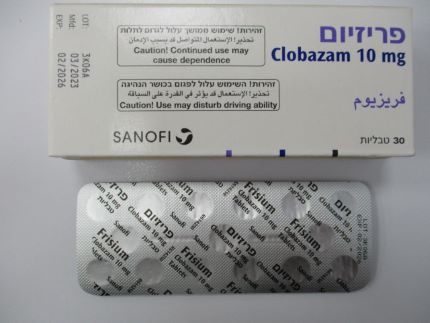Quest for the right Drug

פריזיום FRISIUM (CLOBAZAM)
תרופה במרשם
תרופה בסל
נרקוטיקה
ציטוטוקסיקה
צורת מתן:
פומי : PER OS
צורת מינון:
טבליה : TABLETS
עלון לרופא
מינוניםPosology התוויות
Indications תופעות לוואי
Adverse reactions התוויות נגד
Contraindications אינטראקציות
Interactions מינון יתר
Overdose הריון/הנקה
Pregnancy & Lactation אוכלוסיות מיוחדות
Special populations תכונות פרמקולוגיות
Pharmacological properties מידע רוקחי
Pharmaceutical particulars אזהרת שימוש
Special Warning עלון לרופא
Physicians Leaflet
Special Warning : אזהרת שימוש
4.4 Special warnings and precautions for use Amnesia Amnesia may occur with benzodiazepines. In case of loss or bereavement psychological adjustment may be inhibited by benzodiazepines. Muscle weakness Clobazam can cause muscle weakness. Therefore, in patients with pre-existing muscle weakness or spinal or cerebellar ataxia or sleep apnoea, special observation is required and a dose reduction may be necessary. Clobazam is contraindicated in patients with myasthenia gravis.Suicidal ideation, suicide attempt, suicide and depression Some epidemiological studies suggest an increased incidence of suicidal ideation, suicide attempt and suicide in patients with or without depression and treated with benzodiazepines and other hypnotics, including clobazam. However, a causal relationship has not been established (see section 4.8). Personality disorders Disinhibiting effects may be manifested in various ways. Suicide may be precipitated in patients who are depressed and aggressive behaviour towards self and others may be precipitated. Extreme caution should therefore be used in prescribing benzodiazepines in patients with personality disorders. D ependence Use of benzodiazepines – including clobazam – may lead to the development of physical and psychic dependence upon these products. The risk of dependence increases with dose and duration of treatment; it is also greater in patients with a history of alcohol or drug abuse. Therefore the duration of treatment should be as short as possible (see section 4.2). Once physical dependence has developed, abrupt termination of treatment will be accompanied by withdrawal symptoms (or rebound phenomena). Rebound phenomena are characterised by a recurrence in enhanced form of the symptoms which originally led to clobazam treatment. This may be accompanied by other reactions including mood changes, anxiety or sleep disturbances and restlessness. A withdrawal syndrome may also occur when abruptly changing over from a benzodiazepine with a long duration of action (for example, Frisium) to one with a short duration of action. Serious skin reaction 3/8 Serious skin reactions, including Stevens-Johnson syndrome (SJS) and toxic epidermal necrolysis (TEN), have been reported with clobazam during the post-marketing experience. A majority of the reported cases involved the concomitant use of other drugs, including antiepileptic drugs that are associated with serious skin reactions. SJS/TEN could be associated with a fatal outcome. Patients should be closely monitored for signs or symptoms of SJS/TEN, especially during the first 8 weeks of treatment. Clobazam should be immediately discontinued when SJS/TEN is suspected. If signs or symptoms suggest SJS/TEN, use of this drug should not be resumed and alternative therapy should be considered (see section 4.8). 4/8 R espiratory depression Respiratory function should be monitored in patients with chronic or acute severe respiratory insufficiency and a dose reduction of clobazam may be necessary. Clobazam is contraindicated in patients with severe respiratory insufficiency (see section 4.3). R enal and hepatic impairment In patients with impairment of renal or hepatic function, responsiveness to clobazam and susceptibility to adverse effects are increased, and a dose reduction may be necessary. In long-term treatment renal and hepatic function must be checked regularly. E lderly patients In the elderly, due to the increased sensitivity to adverse reactions such as drowsiness, dizziness, muscle weakness, there is an increased risk of fall that may result in serious injury. A dose reduction is recommended. C YP2C19 poor metabolisers In patients who are CYP2C19 poor metabolisers, levels of the active metabolite N-desmethylclobazam are expected to be increased as compared to extensive metabolisers. As this may lead to increased side effects, dosage adjustment of clobazam may be necessary (e.g. low starting dose with careful dose titration (see section 5.2). Concomitant use of cannabidiol The concomitant use of clobazam with cannabidiol-containing medicinal and non-medicinal products may result in increased exposure to N-desmethylclobazam, leading to increased incidence of somnolence and sedation. Dosage adjustment of clobazam may be necessary. Non-medicinal products containing cannabidiol must not be taken in combination with clobazam as they contain unknown quantities of cannabidiol and are of variable quality (see sections 4.5 and 5.2). Alcohol It is recommended that patients abstain from drinking alcohol during treatment with clobazam (increased risk of sedation and other adverse effects) (see section 4.5). C oncomitant use of opioids and benzodiazepines Concomitant use of opioids and benzodiazepines, including clobazam, may results in sedation, respiratory depression, coma, and death. Because of these risks, reserve concomitant prescribing of opioids and benzodiazepines for use in patients for whom alternative treatment options are inadequate. If a decision is made to prescribe clobazam concomitantly with opioids, prescribe the lowest effective dosages and minimum durations of concomitant use, and follow patients closely for signs and symptoms of respiratory depression and sedation (see section 4.5).
Effects on Driving
4.7 Effects on ability to drive and use machines Sedation, amnesia, impaired concentration and impaired muscular function may adversely affect the ability to drive or to use machines. If insufficient sleep duration occurs, the likelihood of impaired alertness may be increased (see section 4.5). This medicine can impair cognitive function and can affect a patient's ability to drive safely. When prescribing this medicine, patients should be told: • The medicine is likely to affect your ability to drive. • Do not drive until you know how the medicine affects you. 8/8

שימוש לפי פנקס קופ''ח כללית 1994
לא צוין
תאריך הכללה מקורי בסל
לא צוין
הגבלות
לא צוין
מידע נוסף
